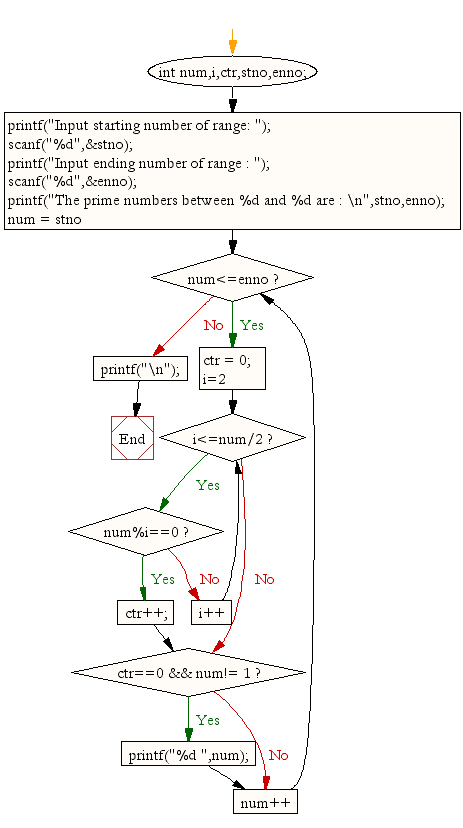C Exercises: Find the prime numbers within a range of numbers
C For Loop: Exercise-34 with Solution
Write a program in C to find the prime numbers within a range of numbers.
Sample Solution:
C Code:
#include <stdio.h>
void main(){
int num,i,ctr,stno,enno;
printf("Input starting number of range: ");
scanf("%d",&stno);
printf("Input ending number of range : ");
scanf("%d",&enno);
printf("The prime numbers between %d and %d are : \n",stno,enno);
for(num = stno;num<=enno;num++)
{
ctr = 0;
for(i=2;i<=num/2;i++)
{
if(num%i==0){
ctr++;
break;
}
}
if(ctr==0 && num!= 1)
printf("%d ",num);
}
printf("\n");
}
Sample Output:
Input starting number of range: 1 Input ending number of range : 50 The prime numbers between 1 and 50 are : 2 3 5 7 11 13 17 19 23 29 31 37 41 43 47
Flowchart:

C Programming Code Editor:
Improve this sample solution and post your code through Disqus.
Previous: Write a C program to display Pascal's triangle
Next: Write a program in C to display the first n terms of Fibonacci series.
What is the difficulty level of this exercise?
Test your Programming skills with w3resource's quiz.
C Programming: Tips of the Day
Static variable inside of a function in C
The scope of variable is where the variable name can be seen. Here, x is visible only inside function foo().
The lifetime of a variable is the period over which it exists. If x were defined without the keyword static, the lifetime would be from the entry into foo() to the return from foo(); so it would be re-initialized to 5 on every call.
The keyword static acts to extend the lifetime of a variable to the lifetime of the programme; e.g. initialization occurs once and once only and then the variable retains its value - whatever it has come to be - over all future calls to foo().
Ref : https://bit.ly/3fOq7XP
- New Content published on w3resource:
- HTML-CSS Practical: Exercises, Practice, Solution
- Java Regular Expression: Exercises, Practice, Solution
- Scala Programming Exercises, Practice, Solution
- Python Itertools exercises
- Python Numpy exercises
- Python GeoPy Package exercises
- Python Pandas exercises
- Python nltk exercises
- Python BeautifulSoup exercises
- Form Template
- Composer - PHP Package Manager
- PHPUnit - PHP Testing
- Laravel - PHP Framework
- Angular - JavaScript Framework
- Vue - JavaScript Framework
- Jest - JavaScript Testing Framework
